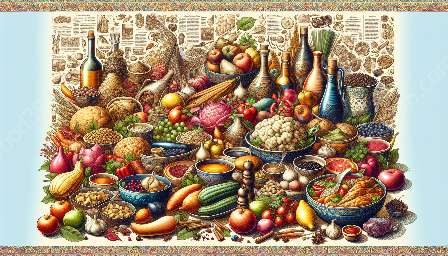Japanese food culture is renowned for its unique flavors, presentation, and deep-rooted traditions. From the origins of traditional meals to the evolution of culinary practices, this fascinating culinary journey offers insights into the history and cultural significance of Japanese cuisine.
The Origins of Japanese Food Culture
The foundation of Japanese food culture can be traced back to the Jomon period, which dates back to approximately 10,000 BC. During this era, the Japanese people relied on hunting, fishing, and gathering wild plants for sustenance. The introduction of rice cultivation during the Yayoi period (300 BC - 300 AD) revolutionized the Japanese diet and laid the groundwork for the rich culinary tradition that followed.
The Evolution of Japanese Food
Over the centuries, Japan's food culture underwent significant transformations influenced by various factors, including cultural exchange, technological advancements, and social changes. The introduction of Buddhism in the 6th century brought dietary restrictions and the popularization of vegetarian cuisine, shaping the development of a unique culinary identity.
The Influence of Shokunin and Traditional Techniques
The concept of shokunin, or the dedication to one's craft, is deeply ingrained in Japanese food culture. It is reflected in the meticulous preparation of dishes, attention to seasonal ingredients, and the mastery of traditional cooking techniques such as sushi-making, noodle pulling, and tea ceremony practices.
The Role of Food in Japanese History
Food has played a crucial role in shaping Japan's history, from the emergence of formal dining traditions in the Heian period to the development of kaiseki cuisine during the Edo period. Additionally, the influence of foreign trade, colonialism, and war has left indelible marks on Japanese culinary practices, reflecting a dynamic and ever-evolving food culture.
The Cultural Significance of Japanese Food
Japanese food goes beyond mere sustenance; it embodies social customs, aesthetic values, and philosophical principles. The concept of washoku, recognized as an Intangible Cultural Heritage by UNESCO, emphasizes the harmony of flavors, colors, and textures, promoting a holistic approach to dining that celebrates the interconnectedness of nature, culture, and community.
Food Culture and History: A Symbiotic Relationship
The intricate relationship between food culture and history is evident in Japan's culinary landscape, where traditional dishes serve as vibrant expressions of regional heritage and ancestral wisdom. Elements of ritual, symbolism, and seasonality intertwine to create an immersive gastronomic experience that encapsulates the essence of Japanese history and cultural identity.


